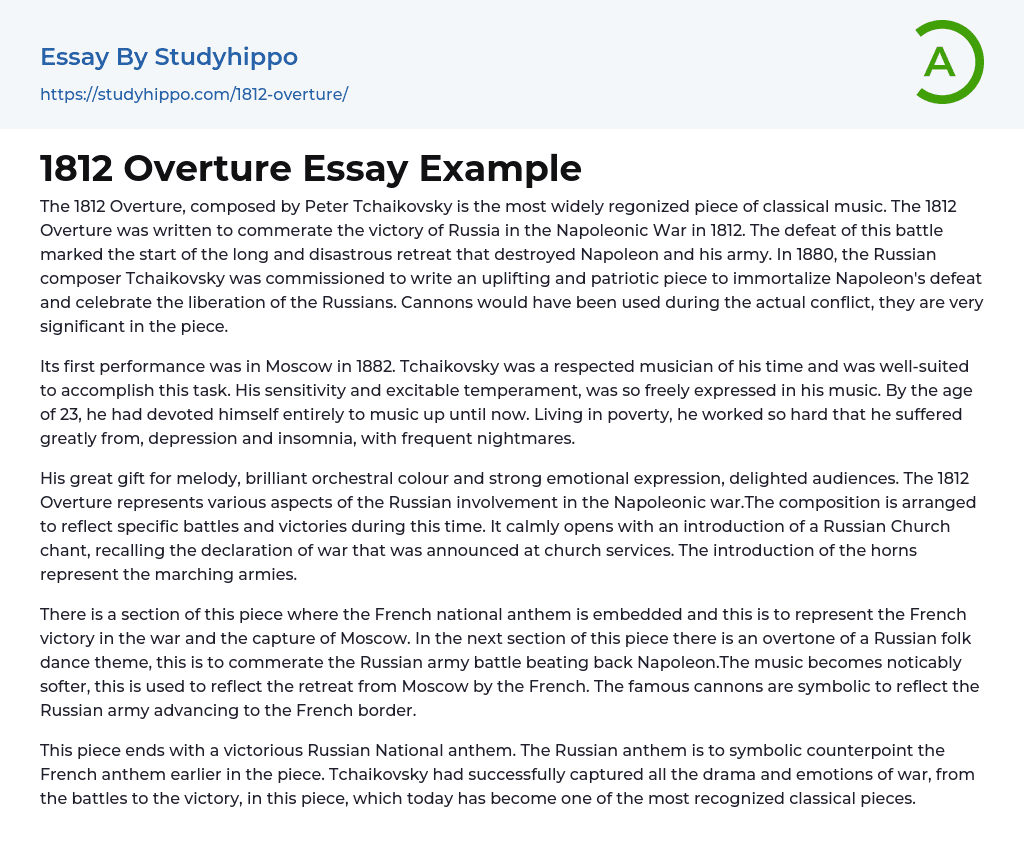The 1812 Overture, composed by Peter Tchaikovsky is the most widely regonized piece of classical music. The 1812 Overture was written to commerate the victory of Russia in the Napoleonic War in 1812. The defeat of this battle marked the start of the long and disastrous retreat that destroyed Napoleon and his army. In 1880, the Russian composer Tchaikovsky was commissioned to write an uplifting and patriotic piece to immortalize Napoleon's defeat and celebrate the liberation of the Russians. Cannons would have been used during the actual conflict, they are very significant in the piece.
Its first performance was in Moscow in 1882. Tchaikovsky was a respected musician of his time and was well-suited to accomplish this task. His sensitivity and excitable temperament, was so freely expressed in his music. By the age of 23, he had devoted himself ent
...irely to music up until now. Living in poverty, he worked so hard that he suffered greatly from, depression and insomnia, with frequent nightmares.
His great gift for melody, brilliant orchestral colour and strong emotional expression, delighted audiences. The 1812 Overture represents various aspects of the Russian involvement in the Napoleonic war.The composition is arranged to reflect specific battles and victories during this time. It calmly opens with an introduction of a Russian Church chant, recalling the declaration of war that was announced at church services. The introduction of the horns represent the marching armies.
There is a section of this piece where the French national anthem is embedded and this is to represent the French victory in the war and the capture of Moscow. In the next section of this piece there is an overtone o
a Russian folk dance theme, this is to commerate the Russian army battle beating back Napoleon.The music becomes noticably softer, this is used to reflect the retreat from Moscow by the French. The famous cannons are symbolic to reflect the Russian army advancing to the French border.
This piece ends with a victorious Russian National anthem. The Russian anthem is to symbolic counterpoint the French anthem earlier in the piece. Tchaikovsky had successfully captured all the drama and emotions of war, from the battles to the victory, in this piece, which today has become one of the most recognized classical pieces.
- Sonnet essays
- Concert essays
- Piano essays
- Hip Hop essays
- Music Reference essays
- Musical Instruments essays
- Mp3 essays
- Recording essays
- Music video essays
- Singing essays
- Song essays
- Tupac shakur essays
- Classical Music essays
- Opera essays
- Rock Music essays
- Blues essays
- Jazz essays
- Sonata essays
- Baroque Music essays
- Rock And Roll essays
- Ludwig Van Beethoven essays
- Michael Jackson essays
- Popular music essays
- Band essays
- Classical Concert essays
- Music Concert Report essays
- Music Awards essays
- Walk This Way essays
- Song Analysis essays
- Vladimir Lenin essays
- Culture essays
- Social Control essays
- Citizenship essays
- Social Justice essays
- Caste System essays
- Social Responsibility essays
- Socialization essays
- Deviance essays
- Modern Society essays
- Popularity essays
- Civil Society essays
- Community essays
- Female essays
- Filipino People essays
- Igbo People essays
- Indigenous Australians essays
- Indigenous Peoples essays
- Minority Group essays
- Social Institution essays
- Men essays




